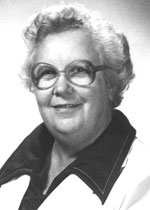Taking Charge and Making a Difference
June 19, 2008
 As one of the founding faculty members for OBU's nursing program, she served on the University's faculty for 34 years. In 1952, she helped launch Oklahoma's first baccalaureate degree program in nursing. But her unique story began before that academic milestone.
As one of the founding faculty members for OBU's nursing program, she served on the University's faculty for 34 years. In 1952, she helped launch Oklahoma's first baccalaureate degree program in nursing. But her unique story began before that academic milestone.
At the age of 15, living in Atoka, Okla., Proctor took on the responsibility of supporting her family after her father died. In 1941, following high school graduation, she attended Wesley Hospital's nursing program in Oklahoma City.
During World War II, the Red Cross requested that
"They were really getting short of nurses in military hospitals in the states. A lot of injured people were coming back," she said.
Learning to be responsible for her family at a young age helped
"I was just a cadet nurse, but I was told to not let soldiers believe you're not a cadet nurse," she said. "I always had a commanding voice and told a marine squad leader it was important that his men received penicillin shots every three hours the first day."
That level of respect prompted a visit from the top officer at the base.
"About mid-afternoon the base commander came to me and said, 'I hear we have a new commander,'" said
"We became really good friends and my commanding officer was amazed," she continued. "She heard about the meeting and called me in when I was off duty. She said, 'Ms. Proctor, usually you're in trouble if you see the base commander, and he knows your name already.'"
Upon her completion of duty in 1946,
Having completed the registered nurse program at Wesley Hospital, she earned a bachelor's degree in nursing at Case Western Reserve University in Cleveland, Ohio, and later earned a master's degree at the University of Chicago.
After she started teaching at OBU,
"You don't know me," he said. "But we need a nurse if we're going to keep the medical unit of Tinker, and everybody on staff said 'Talk to
Juanita trained corpsmen at TAFB for the next 11 years. At the time, she was the only female serving in the Air Force Reserve.
"Working at OBU I could also work at Tinker because I had a flexible schedule," she said. "I decided to recruit other nurses, and in two weeks I was a first lieutenant. I went on leave to go to the University of Chicago to get my master's degree. When I came back, I was a major."
Juanita recalls the start of OBU's baccalaureate program in nursing. The first class would include 10 nursing students.
"Many were already enrolled at OBU because of the possibility that the nursing program was going to be added," she said. "We also had one transfer in from Tennessee, so that first graduating class had 11."
Many of her memories of serving at OBU involve people confusing her with another OBU nursing pioneer, Juanita Millsap. Proctor is quick to point out that they spell their names differently.
"I was named Alumni Association Hall of Fame by former OBU nursing student Rosemary Blankenship Atkins, a 1954 Atoka after the Choctaw princess," said
Juanita Millsap also taught
"If there wasn't anything wrong with my tests or papers that I turned in, she would correct my name, just to find something to correct," Proctor said jokingly.
OBU still holds a place in her heart.
Recently she was inducted in the Atoka graduate. Atkins graduated from OBU in 1958, in the third class of graduates from the University's nursing program.
"OBU is a special place," she said. "I wouldn't take away my memories and the friendships I developed there. It was more than a teaching and training experience for me. I made friends for life."
Her commitment to OBU and her ability to take charge have combined in a unique way, as